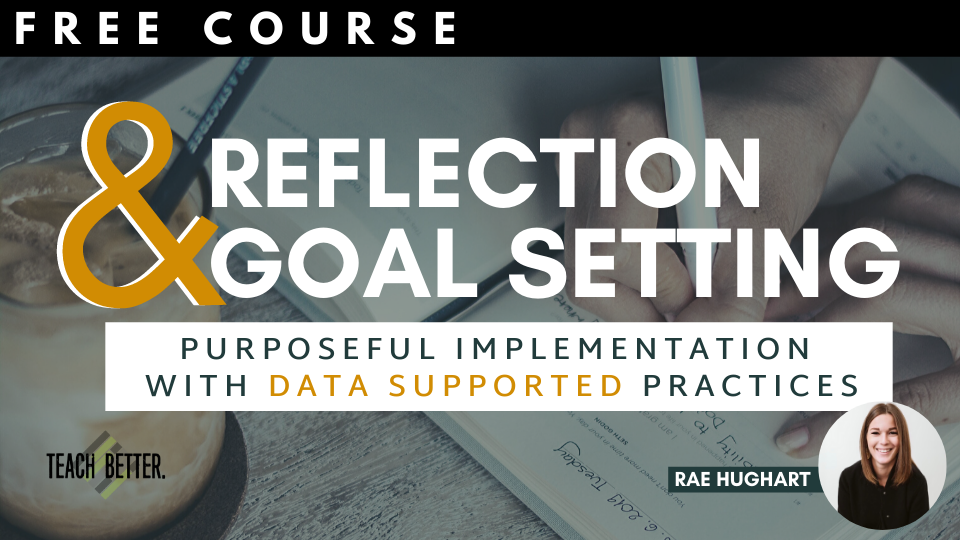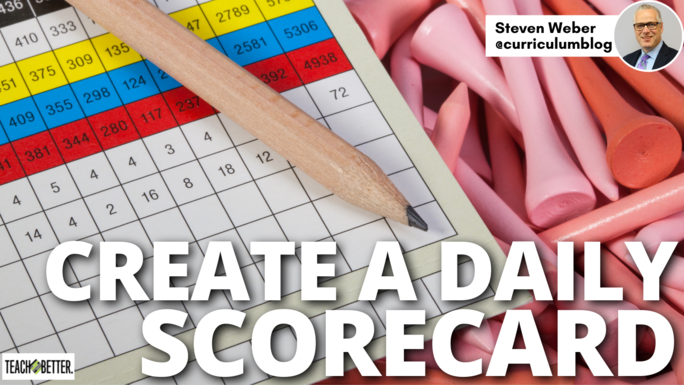TL;DR:
- Educators can create a daily scorecard in order to reflect and measure progress towards the things that matter most.
- This post shares a daily scorecard for teachers, counselors, and both school and district administrators.
If you are a teacher or an administrator, you can either let others define your success or you can create a daily scorecard. Teachers and schools are ranked. There are Blue Ribbon Schools, Schools to Watch, Solution Tree Model PLC Schools, and Project Lead The Way Distinguished Schools. Individual recognitions include state principal of the year, state teacher of the year, NBCT, NASSP Digital Principal of the Year, and Presidential Awards for Excellence in Mathematics and Science Teaching (PAEMST). The reality is that a majority of teachers in a school district will never be the state teacher of the year. A majority of schools in a state will never be identified as a model school or exemplary school.
Win the Day
If educators focus on winning a state or national recognition or hanging another banner in the school lobby, they may become discouraged. This should not deter educators from the pursuit of excellence. Winning the Day is a mindset that focuses on being the best “you,” one day at a time. There are several things outside our control, but we can become intentional about our personal and professional growth. Educators can create a daily scorecard in order to measure progress towards the things that matter most.
A growth mindset allows educators to create a daily scorecard with three questions. Choose three questions that you can use to help you grow. Click To TweetA Scorecard
In golf, a scorecard is used to measure progress one hole at a time. How could a scorecard support educators? “The team can make adjustments when it knows where it stands” (Maxwell, The Law of the Scoreboard). In the absence of a scorecard and daily reflection, it is difficult to make adjustments as a teacher or administrator.
The first step is to determine what you will measure. If you focus on growth, you will be amazed at how much you accomplish in a short amount of time. The following examples may provide you with a scorecard that you can use for daily reflection. If none of the examples apply to your school or role in education, you may wish to design your own scorecard following a similar format.
Scorecard for Teachers
- What’s one way I impacted student understanding today?
- What’s one non-academic win that our class had today?
- What was the highlight from today?
Scorecard for Counselors
- How was my school better today because I chose to become a professional counselor?
- What’s one small win that I had or observed today?
- What was my top priority today and was I able to remain focused on this priority?
Scorecard for Assistant Principals and Principals
- What’s one outstanding lesson or classroom that I observed today?
- How did I support teaching and learning?
- What’s one way our staff focused on the whole child today?
Scorecard for Directors
- How did I support teachers and administrators today?
- What was one highlight from today?
- How am I using my strengths to support those I lead?
Scorecard for Superintendents
- What is one lesson I learned today?
- How did I multiply leaders in our district today?
- What was a bright spot today?

Are You In a Growth Mindset or a Victim Mindset?
In education, we reflect on data. There are school teams that focus on data walls, state testing data, MAP data, common formative assessment data, and more. Some schools are told by the state that they are on an academic watch list. There are multiple ways that a school and educators are measured. Data can inform our instruction and it can support continuous improvement.
Some educators spend a majority of their time frustrated or disappointed in the data. Other educators compare themselves to the teacher of the year or the teacher who was recognized at the last school assembly. While there is nothing wrong with data or recognition, there is a more proactive way to live and grow.
A growth mindset allows educators to create a daily scorecard with three questions. Choose three questions that you can use to help you grow. “To reach your potential you must grow. And to grow, you must be highly intentional about it” (Maxwell, 2012). Educators should celebrate the daily wins. Teachers and administrators cannot afford to go through each day hoping to grow.
Quite often, teachers spend a large amount of time focused on students and identifying strategies to support student growth. This can lead to spending less time reflecting on our own strengths and how our inputs are affecting outputs. How can a daily scorecard support you?
About Steven Weber
Dr. Steven Weber is the Associate Superintendent for Teaching and Learning with Fayetteville Public Schools (AR). His areas of research include curriculum design, formative assessment, professional learning, and school leadership.



